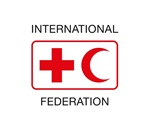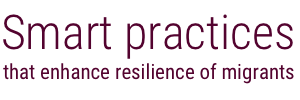The project organizes role plays in which children in schools re-enact the migration journey. Designed to foster empathy and understanding of what migrants have had to go through, it increases acceptance among young people in host communities.
The Swedish Red Cross youth manages the On the Run project, in which young people in schools role play forced migration scenarios in workshops organized by volunteers. The role plays aim to increase understanding among Swedish youth of the realities of forced migration, to increase their empathy and acceptance of migrants.
To be realistic and emotionally compelling, the role play is based on the stories of actual migrants and simulates situations that arise when fleeing a country. Participants face a series of difficult choices and their decisions can bring severe consequences in the simulation. The role plays help participants understand in a more tangible way what it means and feels like to be displaced. Participants play the role of migrants and interact with instructors who play the roles of characters that migrants meet when migrating. The session ends with information and discussion of migration flows in the world and highlights the right to asylum. The role play is a way to increase understanding of what it can mean to be on the run and to work for humanity and human rights.
In 2015, a total of 3,593 young people took part in role plays. Between January and May 2016, 2,136 young people participated.
Design. [P1] Focuses on sensitizing the host community to the realities that migrants face, thereby reducing migrants’ vulnerability to xenophobia.
Programmes. [P9] Focuses on forced displacement.
- Getting volunteers to fully execute the role plays.
- Meeting high numbers of simultaneous demands for the roleplay from schools and other actors (e.g., demand in 2015 led to a shut down of the booking site).
- Determining how up-to-date information in the roleplay has to be to be relevant (given the dynamism of migration).
- It is important to provide clearly structured information to volunteers, and provide tangible practical details.
- Retaining volunteers to manage the programme is essential, as they are central to the success of the role plays.
Smart practices
Smart practices report and database survey
About the report
People migrate in pursuit of a better life for themselves and their families. As described in the International Federation of Red Cross and Red Crescent Societies’ (IFRC) Policy on Migration, “migrants are persons who leave or flee their habitual residence to go to new places – usually abroad – to seek opportunities or safer and better prospects.
Read more
About the International Federation

